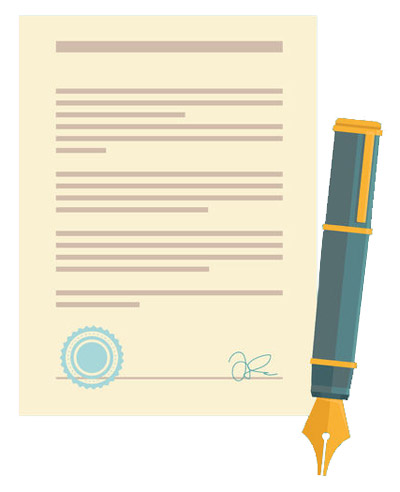It’s unfortunate, but the scenario we’re currently living in with the COVID-19 outbreak has caused many people to reconsider the reality that we never know what will happen in life and it can always throw you a curveball. Everyone dies, and sometimes it can be entirely out of our control and without warning.
Now, this isn’t to say that a large number of young and healthy people will pass from this, but it does raise the issue of the importance of having your affairs in order in case the worst actually were to occur.
This is even more important for families with young children or dependents.
So Why are a Will and Power of Attorney Important?
A legal will is loosely defined as “a legal document that expresses a person’s (testator) wishes as to how their property (estate) is to be distributed after their death and as to which person (executor) is to manage the property until its final distribution.”[1]
A power of attorney is described as “a written authorization to represent or act on another’s behalf in private affairs, business, or some other legal matter.”[2]
A will is an important document to have, as it’s not simply a matter of “who gets your stuff” when you die, but covers off many other important decisions. Some of which include, who will handle your funeral arrangements, distribute your estate, how will your assets be divided, who will look after your children and how and when will the money be disbursed? Also in the case of an accident, who will care for you or take care of your finances?
If you don’t have a legal will, all of these issues could be decided by the government and is not something you want to leave out of your own control. It could end up disastrous.
Executors
Many people naively, although unknowingly assume that when they die their spouse, children or close family member will simply take care of their affairs. The reality is that in many cases, these options are not available or just create conflict among family members.
Let’s say you have assumed your spouse will receive all of your assets. Now, what happens if you both die at the same time in an accident? This leaves many questions wide open and lots of potential disagreements, particularly if different members or sides of the families are not on good terms.
This is where the importance of executors comes in and alternates. You can always name your spouse but should have a backup in case of a tragic accident or another unlikely scenario. This is not only important for your assets and having someone you trust in charge of things, but even more so if you have dependents to look after.
If you are older, you may possibly have children you do not wish to be involved in handling your estate, so establishing an executor and backups or alternates is very important to avoid fighting among family members.
Guardianship of your Children
I cannot stress enough for young families how important it is to have guardians named for your children as well as alternates. You should definitely discuss this with people who you would consider for such an important undertaking, which hopefully never happens. But, if a common accident were to take place leaving your children alone, it is imperative that you have some control over who they live with and are responsible to care for them in the future. It would be unthinkable for most parents to consider courts deciding, with no direction from their estate as to who the children live with. Particularly if a family member or friend you wish your children did not live with, suddenly decided to take an interest in their future living arrangements and attempted to gain custody.
Circumstances also arise where it may become impossible, unrealistic or unfavourable for your first choice of guardian to take care of your children. You may select a responsible and trusted sibling, but 10 years down the road and after not updating your will, they could have four kids of their own to look after, be in poor health, moved away etc… It’s important to have other options in place and that you decide what is best for your kids.
Trusts
A lot of people who are reading personal finance related blogs are doing so because they are trying to be more responsible with their finances and learn how to manage their money better. Perhaps you are coming from a bad place in regards to debt, or that nobody taught you how to manage your money early on. When you think back, was this a time in your life when you were younger and possibly less responsible? Do you wish you had five or ten years back to re-evaluate some of your financial decisions and how it has shaped your current financial situation and future prospects?
These are things to consider and why it is important to establish a Trust for your children. Imagine you pass with two children and have $500,000 in assets, perhaps in the form of a house and some savings that are to be distributed. Now recall when you weren’t as responsible with your money early on – would you really like your 18-year-old child to suddenly have access to a quarter of a million dollars? Half of your wealth may turn into a sports car overnight.
The amount may be more or less, but the point is the same. Most kids when they legally become an ‘adult’ are not an adult at all in the sense of the word. Having that much money at a young age can also be detrimental to your child’s development as it is easy and tempting to become lazy, unmotivated and even squander years of hard-earned savings Young adults can also become easy targets to predatory individuals who are looking to separate them from their newly found wealth.
This is where trusts come in and I won’t dive deep into detail, but they basically allow you to have some say in how your money is distributed. Perhaps you decide your estate will only have your children’s living expenses or schooling costs covered until they are the age you deem appropriate to release the rest of their inheritance. Or perhaps it is released in stages, or as a supplementary income until a certain point. These types of strategies can keep them motivated to achieve their goals, while still benefiting from any financial support they might require along the way as well as protecting the wealth you would like to pass on to them.
Power of Attorney
Power of Attorney (or Living Will) documents are something that can be overlooked when creating your will as well. Basically, the idea behind them, is that if for some reason you become incapacitated, have some sort of accident where you can’t communicate or lose mental capabilities to make proper decisions, you have appointed someone to act on your behalf. This can again be your spouse but is important to have that person defined as well as have alternates in both scenarios. This is the person who is going to be responsible for making decisions for you and directing your personal care. This in itself is clearly a reason to choose someone you have complete confidence in and that you trust to act in your best interests. It also removes the potential for disputes in most cases.
Update Your Will from Time to Time
It’s also important not to write your will and then just let it sit in an envelope until you die, especially if you are younger. This should be obvious to most people, but it is just something that is often neglected and overlooked. People don’t bother getting around to doing mundane tasks like this, as it is usually low on the list of ‘important’ things to do during our busy day-to-day lives. It is however massively important in the grand scheme of things.
So how often should you update your will? There’s no real right answer here, but every 3-5 years is probably a good guideline or whenever you have any substantial changes take place in your life. You can also from time to time keep an updated inventory of each person’s assets in a separate document with your will, for example, if you want a special item to go to a particular family member or friend. It’s important to keep track of things as your assets change.
It’s just as important to keep the critical parts of your will up to date such as executors and guardians – as mentioned above, those people you have chosen may have also encountered changes in their lives, which may no longer make them suitable choices, for any number of reasons.
How much will this cost me?
I guess the bigger question is, how much will it cost your family if you die and don’t have a will? Particularly if you have kids that need looking after – I can’t stress this point enough. The costs for a will can actually vary quite a bit and doesn’t necessarily speak to the quality of a will as it can be a pretty straightforward legal document. Look for recommendations or reviews from people you trust or someone who has experience in the matter. I would always recommend having a legal professional do this too versus something like online wills or downloading a template off the Internet and attempting it yourself to save a few dollars. This could be a costly decision down the road.
Have a legal will and power of attorney is the responsible thing to do for you and your family. There should really be no excuse not to have one. Once you have drafted your will, keep it in a safe place and keep a copy at home.
Please note this article is not meant to contain any sort of legal advice, I am not a lawyer nor claim to be. Draft your important documents with the guidance of a professional.
1. ^ https://en.wikipedia.org/wiki/Will_and_testament
2. ^ https://en.wikipedia.org/wiki/Power_of_attorney




